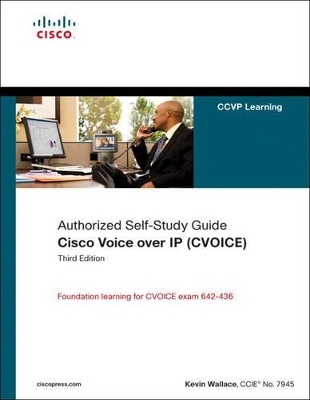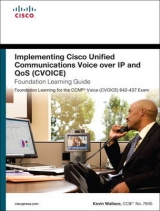
Cisco Voice over IP (CVOICE) (Authorized Self-Study Guide)
Cisco Press
978-1-58705-554-6 (ISBN)
- Titel erscheint in neuer Auflage
- Artikel merken
Cisco Voice over IP (CVOICE)
Third Edition
Foundation learning for CVOICE exam 642-436
Kevin Wallace, CCIE No. 7945
Cisco Voice over IP (CVOICE), Third Edition, is a Cisco-authorized, self-paced learning tool for CCVP foundation learning. This book provides you with the knowledge and skills required to plan, design, and deploy a Cisco voice-over-IP (VoIP) network and to integrate gateways and gatekeepers into an enterprise VoIP network. By reading this book, you will gain a thorough understanding of converged voice and data networks and also the challenges you will face implementing various network technologies.
Cisco Voice over IP (CVOICE) presents you with information on the foundational elements of VoIP calls, the description of dial plans, and the implementation of gateways, gatekeepers, and Cisco Unified Border Elements (Cisco UBEs). The book gives you the information needed to implement and support data and voice integration solutions at the network-access level.
Whether you are preparing for CCVP certification or simply want to gain a better understanding of VoIP fundamentals, you will benefit from the foundation information presented in this book.
Cisco Voice over IP (CVOICE), Third Edition, is part of a recommended learning path from Cisco that includes simulation and hands-on training from authorized Cisco Learning Partners and self-study products from
Cisco Press. To find out more about instructor-led training, e-learning, and hands-on instruction offered by authorized Cisco Learning Partners worldwide, please visit http://www.cisco.com/go/authorizedtraining.
Kevin Wallace, CCIE No. 7945, is a certified Cisco instructor, and he teaches courses in the Cisco CCSP, CCVP, and CCNP® tracks. With 19 years of Cisco networking experience, Kevin has been a network design specialist for the Walt Disney World Resort and a network manager for Eastern Kentucky University.
Integrate VoIP into an existing data network
Design a VoIP network for optimal voice quality
Examine the various call types in a VoIP network
Configure analog voice interfaces and dial peers
Perform call signaling over digital voice ports
Implement H.323, MGCP, and SIP protocols on Cisco IOS® gateways
Identify dial plan characteristics
Configure advanced dial plans
Deploy H.323 gatekeepers
Implement a Cisco UBE router to provide protocol interworking
Companion CD-ROM
The CD-ROM contains a bonus 90 minutes of video demonstrations. Watch the author perform fundamental CVoice configuration tasks in a series of six video-on-demand labs.
This volume is in the Certification Self-Study Series offered by Cisco Press. Books in this series provide officially developed self-study solutions to help networking professionals understand technology implementations and prepare for the Cisco Career Certifications examinations.
Category: Voice over IP
Covers: CVoice exam 642-436
Kevin Wallace , CCIE No. 7945, is a certified Cisco instructor, and he teaches courses in the Cisco CCSP, CCVP, and CCNP tracks. With 19 years of Cisco networking experience, Kevin has been a network design specialist for the Walt Disney World Resort and a network manager for Eastern Kentucky University. Kevin holds a bachelor of science degree in electrical engineering from the University of Kentucky. Kevin also is a CCVP, CCSP, CCNP, and CCDP with multiple Cisco security and IP communications specializations.
Chapter 1 Introducing Voice over IP Networks 3
VoIP Fundamentals 3
Cisco Unified Communications Architecture 3
VoIP Overview 4
Components of a VoIP Network 6
VoIP Functions 7
VoIP Signaling Protocols 9
The H.323 Umbrella 9
MGCP 11
Session Initiation Protocol 12
Skinny Client Control Protocol 12
Comparing VoIP Signaling Protocols 12
VoIP Service Considerations 15
Media Transmission Protocols 16
Real-Time Transport Protocol 16
RTP Control Protocol 17
Compressed RTP 18
Secure RTP 20
Introducing VoIP Gateways 21
Understanding Gateways 21
Modern Gateway Hardware Platforms 24
Well-Known and Widely Used Enterprise Models 27
Standalone Voice Gateways 30
Summary of Voice Gateways 34
IP Telephony Deployment Models 36
Summary 50
Chapter Review Questions 51
Chapter 2 Considering VoIP Design Elements 55
VoIP Fundamentals 55
IP Networking and Audio Clarity 55
Audio Quality Measurement 61
VoIP and QoS 63
Transporting Modulated Data over IP Networks 66
Understanding Fax/Modem Pass-Through, Relay, and Store and Forward 67
Modem Relay 71
Gateway Signaling Protocols and Fax Pass-Through and Relay 74
DTMF Support 82
Processing Voice Packets with Codecs and DSPs 84
Codecs 85
Impact of Voice Samples and Packet Size on Bandwidth 87
Data Link Overhead 88
Security and Tunneling Overhead 88
Calculating the Total Bandwidth for a VoIP Call 88
Effects of Voice Activity Detection on Bandwidth 90
DSP 91
Codec Complexity 95
DSP Requirements for Media Resources 98
Configuring Conferencing and Transcoding on Voice Gateways 107
Cisco IOS Configuration Commands for Enhanced Media
Resources 114
Verifying Media Resources 119
Summary 120
Chapter Review Questions 121
Chapter 3 Routing Calls over Analog Voice Ports 125
Introducing Analog Voice Applications on Cisco IOS Routers 125
Local Calls 125
On-Net Calls 126
PLAR Calls 127
PBX-to-PBX Calls 128
Intercluster Trunk Calls 129
Summarizing Examples of Voice Port Applications 131
Introducing Analog Voice Ports on Cisco IOS Routers 132
Voice Ports 132
Analog Voice Ports 133
Configuring Analog Voice Ports 144
Trunks 150
Centralized Automated Message Accounting 154
Direct Inward Dial 157
Timers and Timing 159
Verifying Voice Ports 160
Introducing Dial Peers 164
Understanding Call Legs 164
Understanding Dial Peers 165
Configuring POTS Dial Peers 167
Configuring VoIP Dial Peers 169
Configuring Destination Pattern Options 172
Matching Inbound Dial Peers 175
Characteristics of the Default Dial Peer 177
Matching Outbound Dial Peers 179
Summary 180
Chapter Review Questions 181
Chapter 4 Performing Call Signaling over Digital Voice Ports 185
Introducing Digital Voice Ports 185
Digital Trunks 186
T1 CAS 188
E1 R2 CAS 189
ISDN 191
ISDN Signaling 195
Configuring a T1 CAS Trunk 208
Configuring an E1 R2 Trunk 218
Configuring an ISDN Trunk 220
Verifying Digital Voice Ports 225
Using QSIG for Digital Signaling 232
QSIG Overview 232
Configuring QSIG Support 236
Verifying QSIG Trunks 239
Summary 242
Chapter Review Questions 243
Chapter 5 Examining VoIP Gateways and Gateway Control Protocols 247
Configuring H.323 247
H.323 Gateway Overview 247
Why H.323 250
H.323 Network Components 253
H.323 Call Establishment and Maintenance 258
H.323 Call Flows 259
H.323 Multipoint Conferences 261
Configuring H.323 Gateways 263
Verifying an H.323 Gateway 274
Implementing MGCP Gateways 275
MGCP Overview 275
Why MGCP 276
MGCP Architecture 277
Basic MGCP Concepts 280
MGCP Call Flows 283
Configuring MGCP Gateways 285
Verifying MGCP 290
Implementing SIP Gateways 293
SIP Overview 294
Why SIP 296
SIP Architecture 297
SIP Call Flow 299
SIP Addressing 302
SIP DTMF Considerations 304
Configuring SIP 305
Verifying SIP Gateways 309
Summary 315
Chapter Review Questions 316
Chapter 6 Identifying Dial Plan Characteristics 321
Introducing Dial Plans 321
Dial Plan Overview 321
Endpoint Addressing 324
Call Routing and Path Selection 325
Digit Manipulation 325
Calling Privileges 326
Call Coverage 326
Scalable Dial Plans 326
PSTN Dial Plan Requirements 328
ISDN Dial Plan Requirements 330
Configuring PSTN Dial Plans 331
Verifying PSTN Dial Plans 341
Numbering Plan Fundamentals 348
Numbering Plan Overview 348
Numbering Plan Categories 349
Scalable Numbering Plans 351
Overlapping Numbering Plans 352
Private and Public Numbering Plan Integration 353
Enhancing and Extending an Existing Plan to Accommodate VoIP 355
911 Services 357
Implementing a Numbering Plan Example 359
Summary 361
Chapter Review Questions 362
Chapter 7 Configuring Advanced Dial Plans 367
Configuring Digit Manipulation 367
Digit Manipulation 367
Digit Collection and Consumption 370
Digit Stripping 371
Digit Forwarding 372
Digit Prefixing 373
Number Expansion 374
Caller ID Number Manipulation 377
Voice Translation Rules and Profiles 380
Voice Translation Profiles Versus the dialplan-pattern Command 390
Configuring Digit Manipulation 393
Configuring Path Selection 397
Call Routing and Path Selection 397
Dial Peer Matching 398
Matching Dial Peers in a Hunt Group 404
H.323 Dial-Peer Configuration Best Practices 405
Path Selection Strategies 406
Site-Code Dialing and Toll-Bypass 407
Tail-End Hop—Off (TEHO) 409
Configuring Site-Code Dialing and Toll-Bypass 410
Outbound Site-Code Dialing Example 415
Inbound Site-Code Dialing Example 416
Configuring TEHO 417
Implementing Calling Privileges on Cisco IOS Gateways 420
Calling Privileges 420
Understanding COR on Cisco IOS Gateways 421
Understanding COR for SRST and CME 426
Configuring COR for Cisco Unified Communications Manager
Express 427
Configuring COR for SRST 433
Verifying COR 434
Summary 434
Chapter Review Questions 436
Chapter 8 Configuring H.323 Gatekeepers 441
H.323 Gatekeeper Fundamentals 441
Gatekeeper Overview 441
Gatekeeper Hardware and Software Requirements 445
Gatekeeper Signaling 445
Call Flows with a Gatekeeper 464
Zone Prefixes 468
Technology Prefixes 469
Gatekeeper Call Routing 471
Directory Gatekeepers 479
Gatekeeper Transaction Message Protocol 486
Verifying Gatekeepers 487
Configuring H.323 Gatekeepers 489
Gatekeeper Configuration Steps 489
Configuring Gatekeeper Zones 493
Configuring Zone Prefixes 494
Configuring Technology Prefixes 495
Configuring Gateways to Use H.323 Gatekeepers 497
Dial-Peer Configuration 500
Verifying Gatekeeper Functionality 502
Providing Call Admission Control with H.323 504
Gatekeeper Zone Bandwidth Operation 504
RAI in Gatekeeper Networks 510
Summary 515
Chapter Review Questions 516
Chapter 9 Establishing a Connection with an Internet Telephony Service
Provider 521
Introducing the Cisco Unified Border Element Gateway 521
Cisco Unified Border Element Overview 521
Cisco IOS Image Support for Cisco UBE Gateways 523
Cisco UBE Gateways in Enterprise Environments 523
Protocol Interworking on Cisco UBE Gateways 526
Media Flows on Cisco UBE Gateways 528
Codec Filtering on Cisco UBEs 530
RSVP-Based CAC on Cisco UBEs 530
Cisco UBE Gateways and Gatekeeper Interworking 532
Cisco UBE Gateway Call Flows 533
Configuring Cisco Unified Border Elements 538
Protocol Interworking Command 538
Configuring H.323-to-H.323 Interworking 539
Configuring H.323-to-SIP Interworking 541
Media Flow and Transparent Codec Commands 542
Configuring Transparent Codec Pass-Through and Media Flow-Around 543
Configuring Cisco UBEs and Via-Zone Gatekeepers 544
Verifying Cisco UBEs and Via-Zone Gatekeepers 546
Summary 549
Chapter Review Questions 550
Appendix A Answers to Chapter Review Questions 553
| Erscheint lt. Verlag | 24.7.2008 |
|---|---|
| Reihe/Serie | Authorized Self-Study Guide |
| Verlagsort | Indianapolis |
| Sprache | englisch |
| Maße | 233 x 194 mm |
| Gewicht | 1150 g |
| Themenwelt | Mathematik / Informatik ► Informatik ► Netzwerke |
| Mathematik / Informatik ► Informatik ► Web / Internet | |
| ISBN-10 | 1-58705-554-6 / 1587055546 |
| ISBN-13 | 978-1-58705-554-6 / 9781587055546 |
| Zustand | Neuware |
| Haben Sie eine Frage zum Produkt? |
